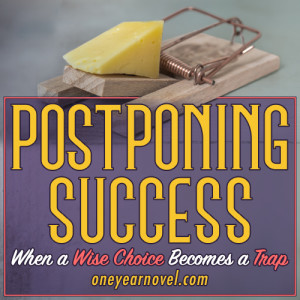Postponing Success: When a Wise Choice Becomes a Trap
By Daniel Schwabauer
 During my first year of college the great literary science fiction writer Kurt Vonnegut spoke at Kansas University at the request of the English Department. I remember him saying that if we wanted to be writers, the last thing we should do is study English at a university. They will make you read great books, he said, and thus you will come to understand that you will never be able to write like Dickens or Twain or Hemingway. So you will stop writing. You will stop writing because you will know how bad your own work is. You will stop writing when what you really need to do is keep writing—even when your words sound like a rusty saw being dragged through a tin can.
During my first year of college the great literary science fiction writer Kurt Vonnegut spoke at Kansas University at the request of the English Department. I remember him saying that if we wanted to be writers, the last thing we should do is study English at a university. They will make you read great books, he said, and thus you will come to understand that you will never be able to write like Dickens or Twain or Hemingway. So you will stop writing. You will stop writing because you will know how bad your own work is. You will stop writing when what you really need to do is keep writing—even when your words sound like a rusty saw being dragged through a tin can.
I found this delightful. Of course, because I was both young and wise, I felt justified in ignoring his advice. I liked Vonnegut, but where else could I learn to write? So I spent eight years studying English at KU.
Now that I am older and more foolish, I find his advice haunting. He was right. Perhaps not universally right about the dangers of studying English in college, but in a more specific sense: what young writers need is to keep writing.
It wasn’t until a few years ago, when I attended a small gathering of writers, and we were reading each other’s work out loud, that I realized I had taken the lessons of my education too much to heart. What I learned in college is that writing is hard! In fact, it is so hard that very few people ever succeed in getting their work legitimized through publication at a major publishing house! Probably you are bound to failure for years and years, and if you ever succeed, it will be when you are old and weary and cynical, and have, like Solomon, learned to see that all storytelling and publishing and even writing itself are vanity. Probably you should give up now because really, Who are you kidding? Have you read your own work?
I’m sure this wasn’t usually the intended message—though I did have one professor who called me into his office to tell me that talent and perseverance didn’t matter; all that mattered was luck, and he didn’t want me to think that I could make a living as a writer.
Looking back, I suspect that my cynical teachers had themselves despaired of success. They had given up on their own dreams and were trying to spare me the sense of disappointment they felt. They had settled for the role of the bitter critic, the person who stands at the side of the road and tells passing athletes why the marathon is not worth running.
I didn’t give up, thank God. But the seeds of hopelessness were planted, and for years I thought of my own work as doomed to obscurity. In fact, I unconsciously began using the difficulty of “success” as an excuse to postpone trying. I kept writing, but stopped submitting. When I was “good enough” I would believe in what I was doing. When I had finally written my magnum opus, then I would brave the terror of an indifferent world. When I was older, publishers would take me seriously.
These weren’t conscious thoughts, or I would have rejected them sooner. Instead, they were an attitude of surrender, an excuse to avoid rejection and let success remain attainable, but always off in the distance.
It is true that young writers tend to think success ought to come immediately, or at the latest sometime next month. I’m convinced that somewhere in the back of every teen writer’s mind is a little voice programmed to say, “This first book of mine could be the next Harry Potter!”
Which necessitates teachers like me suggesting that young writers postpone success for a little while. (Notice I said, little while, not forever!)
Don’t self-publish your first book, I tell my students. You have time. Concentrate on perfecting your craft. Become a GOOD writer before you become a PUBLISHED writer.
My advice is predicated on the reality that any skill takes time and practice to develop, and the first novel you write is probably going to look very different to you five years after you finish it.
And yet, you can put off success too long. Yes, you probably need to write several books before your voice and narrative style become publishable. That doesn’t mean you need to write eighty books, or even eight (as I did) before you begin to expect good things.
It seems obvious to me now that the professors who encouraged me to keep writing were the ones who had achieved some measure of success as writers. I have their books on my shelves, their notes of validation and congratulations pinned to my cork board. Their ghosts remind me that teaching is not merely about knowledge; it’s about making distant things seem near.
You may not be ready to publish five years from now. But don’t let the reason be your own disbelief or inaction.
If the carrot of validation is always the same distance ahead of you, something is wrong.
Success is possible, and don’t let anyone—even yourself—tell you otherwise.
…
 Daniel Schwabauer, MA, is the creator of The One Year Adventure Novel and Cover Story Writing creative writing courses. His professional work includes stage plays, radio scripts, short stories, newspaper columns, comic books and scripting for the PBS animated series Auto-B-Good. His young adult novels, Runt the Brave and Runt the Hunted, have received numerous awards, including the 2005 Ben Franklin Award for Best New Voice in Children’s Literature and the 2008 Eric Hoffer Award. His third book, The Curse of the Seer, released in the summer of 2015.
Daniel Schwabauer, MA, is the creator of The One Year Adventure Novel and Cover Story Writing creative writing courses. His professional work includes stage plays, radio scripts, short stories, newspaper columns, comic books and scripting for the PBS animated series Auto-B-Good. His young adult novels, Runt the Brave and Runt the Hunted, have received numerous awards, including the 2005 Ben Franklin Award for Best New Voice in Children’s Literature and the 2008 Eric Hoffer Award. His third book, The Curse of the Seer, released in the summer of 2015.



Wow, Mr. S. This is really encouraging. Thank you so much for sharing this life-lesson and encouraging us to just keep writing even if it won’t be good the first time. 🙂
Persisting in writing is hard for me, but I know that I just need to keep writing even when it starts out messy ~ because it always will. Not that it won’t get better, but you never create like a master artist until you’ve practiced some. 🙂
Thanks again for the encouragement.
Keep writing! 😀
You’re welcome, Lexi! Glad it was encouraging. And you are right. We won’t create better work until we’ve practiced doing it.
That was wonderful!
Thank you for sharing that Mr. S.!
I have those thoughts sometimes and then I just stop writing for a bit. But then I go back to it and I feel like I could never give it up. And I never could! Without my writing, I wouldn’t feel like myself. 🙂
Thank you again!
I feel the same way. I don’t feel like myself when I stop writing for a while. 🙂
Along with your wisdom that the best writing is perfected foremost by writing all of the time, may I also suggest that new writers avoid as much as possible reading BAD writing? Emails, office memos, even news articles …that are not written well…can pollute your creative mode. Stick with the good stuff from writers who can teach craft. Craft is a safe path to each of our own Future Good Works!
🙂 🙂